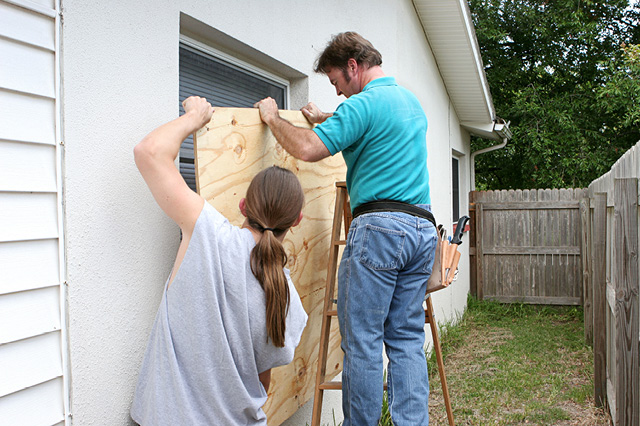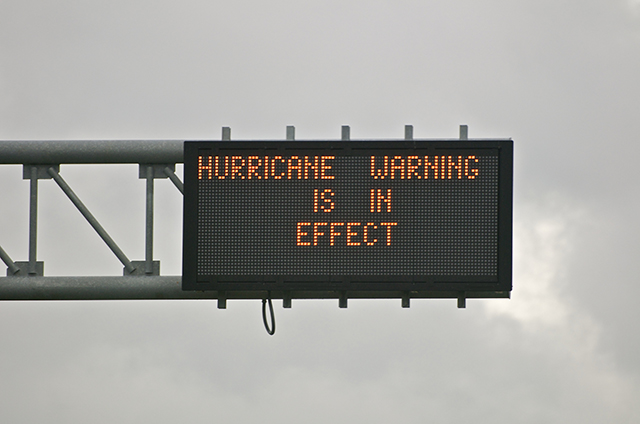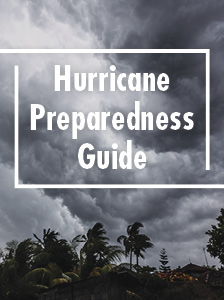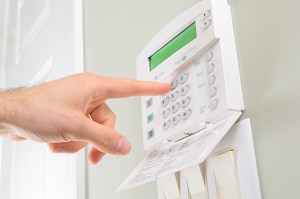Due to its location on the Atlantic coast, the Northeast has its fair share of natural disasters, namely hurricanes, tropical storms and winter storms. As is the nature of nature, flooding, tornadoes, wildfires, hailstorms and even earthquakes can also occur with little to no warning, leaving devastation in their wake.
Natural disaster prep requires practical planning and a few smart investments, but the most important step is ensuring the safety and security of your family.
How to Prepare for a Natural Disaster
Take Precautions
Look into the threats most likely to occur in your area and devise a strategy, such as the three-step plan recommended by the American Red Cross.
Some natural disasters call for evacuation, while others require hunkering down. Account for those in your household – considering young children, the elderly, people with disabilities and pets – and be sure you have supplies to meet their needs. Then, assign tasks and practice your plan.
Keep a survival kit on hand with items such as water, non-perishable foods, medicines and extra clothes. Also consider making a home inventory list. Taking photos and/or making a video of your property can help prove what you have for insurance purposes.
In most instances, homeowners insurance offers some coverage for property damage resulting from natural disasters, but it’s important to review the details with your agent.
“Some perils like earthquakes are usually excluded from a base homeowner policy but can be added as an endorsement,” says Raymond Eng, AAA Vice President of Insurance Sales. “It’s not uncommon for some of these coverages to have separate deductibles which may be stated as a percentage of your dwelling coverage amount.”
Schedule an appointment to discuss your insurance options with a AAA agent today.
Finally, store important financial, legal and medical documents in a safe, waterproof place.

Prep Your Home
Different natural disasters pose various risks to your home. If you are wondering how to prepare for a natural disaster, routine maintenance can help reduce the chance of serious damage.
Keeping your roof in good condition provides extra protection from hurricane winds, tornadoes and hail. Managing wear and tear and replacing your roof when needed can lead to fewer issues down the road.
While maintaining your roof will also protect against heavy rains, sealing your basement can help combat flooding as well. Also, keep your gutters and drainage systems clear by installing gutter guards or screens.
To protect against fires, make sure your smoke detectors are in working order. Outside the home, maintain flammable vegetation by trimming back branches hanging over your roof and keeping grills and woodpiles at least 30 feet away from your home.
For winter storms, make sure your home is winterized, meaning heater vents and drains are unblocked, snow removal tools are accessible and your home is well-insulated.
Though earthquakes are less common in the Northeast, making sure large and heavy structures like chimneys, water heaters and furniture are reinforced or secured can offer peace of mind.
Stay Safe During a Natural Disaster
Staying informed is one of the best things you can do to prepare for a natural disaster. Look and listen for emergency alerts from the Department of Homeland Security or the National Weather Service. A “watch” means there’s a possibility of a natural disaster, while a “warning” is more serious, meaning that a storm is already being tracked.
Keep batteries in your radio, charge your phone and keep it in low power mode to make sure you receive potentially life-saving information.
Be ready to react. Gather your survival kit and essential documents, change into protective clothing and make sure your vehicle’s tank is full in case you need to flee. If you think you’ll be hunkering down, close all doors and windows, reserve the power of electronic devices and collect water for drinking, cooking, washing and flushing toilets.
How to Recover After a Natural Disaster
After a disaster has occurred, check in and around your home to assess any damage and file a claim if needed. Notify your insurance carrier of your situation and they will walk you through the claims process and what to expect.
“In the case of widespread damage typical of natural disasters, timing is important,” says Eng. “It’s not unusual for contractors and the availability of building materials to get backed up, resulting in a longer timeline to complete repairs for the insured.”
Don’t wait for a natural disaster to strike. Preparing your home, family and insurance plans in advance can make a bad situation less difficult.
Learn more about home insurance offered through AAA.
3 Thoughts on “How to Prepare for a Natural Disaster”
Leave A Comment
Comments are subject to moderation and may or may not be published at the editor’s discretion. Only comments that are relevant to the article and add value to the Your AAA community will be considered. Comments may be edited for clarity and length.

















Since cable services rely on electricity, your cellphone might be down for an extended time, so it’s best to have a battery powered radio on hand to listen to outage events. Even a whole house generator could be affected as it was when an ice storm here tore my utilities right off the house when a big tree limb came down.
Make sure that you have registered your cellphone numbers with local emergency management departments. More and more households relying solely on cellular phone technology and fiber/cable/5g for telephone services. The slow elimination of landline phones makes it more difficult for local governments to provide advisories and other information to residents through “reverse-911” systems.
Unlike “back in the day” most if not all house phones (landlines) require the grid to be powered up to work. Most landlines use cable and internet go out with wide power outages.